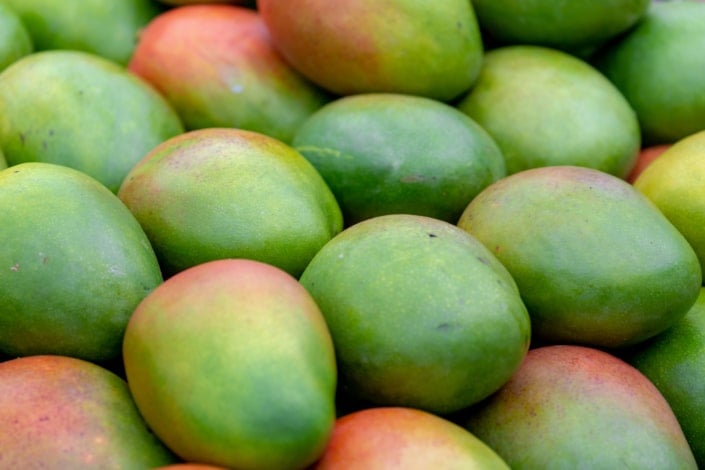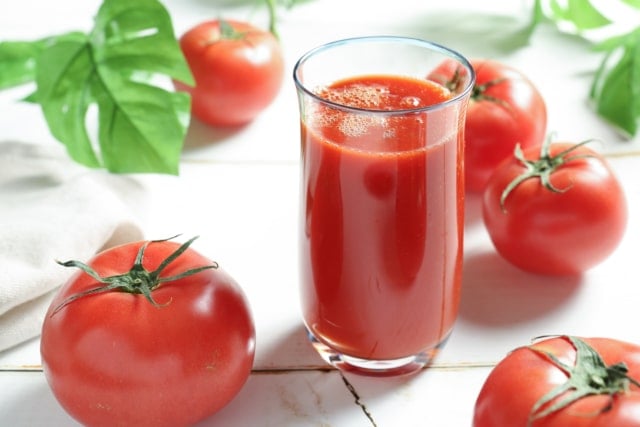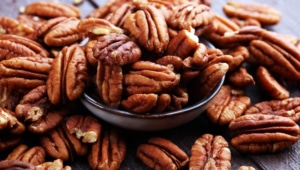Beetroot Juice: 7 benefits, 4 side effects & 4 uses (+Recipe)
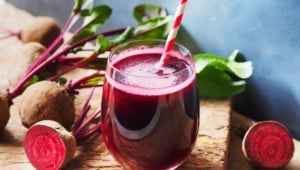
One of the easiest ways to reap the health benefits of beetroot is to drink its juice. Why is beetroot juice so good for you and how can you make it at home? Read on to find out.
Active individuals often make use of the healthy properties of beetroot juice, to boost performance, for example. But the benefits of beetroot juice don’t stop there…
What is beetroot juice?
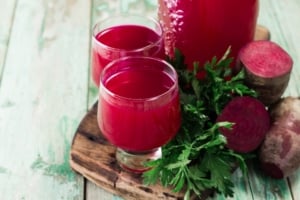
What is beetroot juice?
Beetroot juice– as the name suggests – comes from a popular winter vegetable known as beetroot, beet or red beet.
It belongs to the amaranth family and is also related to the chard and sugar beet.
Beetroot is also considered a medicinal plant due to the effects it has on the health and originally comes from the Mediterranean area, but was brought to Central Europe by the Romans. Its red color is the result of the further refinement that took place in the 19th and 20th centuries.
In the past, beetroot was often used as a dye. It contains a high amount of betanin, a glycoside from the betalain group, which is where the deep red color comes from. In the food industry, betanin is used as a natural dye and labeled with the number E162.
Health benefits of beetroot juice
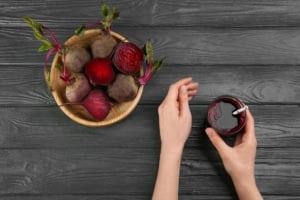
Drinking beetroot juice is comparable to eating the vegetable fresh. Your body gets the nutrients directly from the liquid and you replenish your fluid balance too. But that’s not all…
Weight loss

Beetroot juice for weight loss
A glass of beetroot juice a day can also have a positive impact on your figure. The betanin the vegetable contains helps your lipid metabolism and also facilitates digestion, thus protecting against infections and heartburn.
The juice, with its dark red color, is also very filling and helps keep energy levels balanced. It is low in calories and therefore works well as part of a diet or as a healthy way of keeping weight off in general.
Vitamins and minerals a plenty
Vitamins are important for all your bodily functions and your body can’t make these vitamins on its own, so you need to get them from your diet.
Refrain from heating it and beetroot juice retains all the nutrients of the vegetable itself. It contains, among other things, vitamins B1, B2, B6 and vitamin C, as well as folic acid. It also contains the precursor to vitamin A, known as beta-carotene.
What’s more, consuming beetroot juice also replenishes your body with lots of minerals, including potassium, sodium, magnesium, calcium, iron, zinc and phosphate. Iron, in particular, is key for the formation of red blood cells and helps combat fatigue.
Boosts athletic performance
The betaine contained in beetroot helps athletes to improve their performance, a fact which has been proven by several studies.
In addition, betaine minimizes the depletion of energy reserves and promotes muscle development.
Lowers blood pressure

Beetroot juice lowers your blood pressure
Beetroot juice is also conducive to a healthy heart. Studies have shown that drinking half a liter of beetroot juice per day can lower systolic blood pressure for about 24 hours.
Our saliva reduces the nitrates beetroot contains to nitrite, which causes blood vessels to dilate and blood pressure to lower. You should still check with your doctor first before simply consuming beetroot juice if you are affected by high blood pressure.
Drinking beetroot juice is not alone sufficient to treat high blood pressure and should only be used as a complementary measure.
Promotes blood flow to the brain
By opening blood vessels, as mentioned above, the nitrate also promotes blood flow to the brain. If you drink a glass of beetroot juice every day, you’ll be able to concentrate better and keep calm as you go about your daily life.
This is especially important in old age when cerebral metabolism and neural activity decrease. Regularly consuming beetroot juice has been shown to increase blood flow to the white matter in the frontal lobe of the brain.
Good circulation can even prevent or delay dementia.
Good for the immune system
Due to the high folic acid content, beetroot juice can strengthen your immune system and the betanin it contains is classed as a flavonoid, a group of substances with free radical scavenging abilities.
Too many free radicals in your body can cause oxidative stress, which leads to conditions such as arthritis, arteriosclerosis, and cardiovascular diseases like heart attacks.
High beta-carotene content
Beta-carotenes, also known as vitamin A, also contribute to a healthy heart. What’s more, the vitamin prevents inflammation and helps with your vision. In red, orange and yellow fruits and vegetables, it is responsible for the vibrant color.
Beta-carotene is mainly consumed through fruit and vegetables. Just like folic acid, it is an antioxidant and can also combat free radicals.
What does beetroot juice taste like?
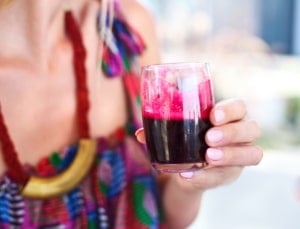
What does beetroot juice taste like?
Beetroot, and especially its juice, tastes a little earthy and is very intense when undiluted. Some people get a bit of a metallic taste from it, which is probably due to the iron.
Whilst some love beetroot juice, for others it’s something to avoid. Pickled beetroot, for example, has quite a sour taste, but if you drink the juice, there’s nothing to say you can’t sweeten or season it as you like. It’s best to drink the juice very chilled so it does not taste so metallic.
How much beetroot juice should you drink a day?
You can drink one glass of beetroot juice a day without a worry. This amount will contribute towards keeping your heart healthy in the long run.
In the morning and before sports
If you want to use beetroot juice to boost your athletic performance, you should drink it about two to three hours before training. In general, however, drinking it right after getting up in the morning will give you the energy and vitamins you need for the day.
Side effects of beetroot juice

As a basic principle, you should try and drink beetroot juice in combination with a varied diet. Too much beetroot juice is not good for your health.
Beware of kidney stones
If you are prone to kidney stones, it’s best to avoid drinking large amounts of beetroot juice. Beetroot contains oxalic acid, which, in combination with calcium, can lead to the formation of kidney stones. This also weakens the kidneys in the long run.
Oxalic acid is also found in other plants and occurs in combination with magnesium, sodium and potassium. These compounds are called oxalates.
Oxalates and oxalic acid come from the food we eat and are excreted in our urine. When high amounts of oxalic acid are excreted, the risk of kidney stones forming increases.
Nitrate
Beetroot absorbs nitrates from the soil from fertilizers and irrigation. There is a suspicion that vegetables containing high amounts of nitrate, such as beetroot, increase the risk of cancer and may therefore act as mild carcinogens.
This, however, is far from proven. Rather, studies show that nitrates have beneficial properties.
Discoloration
As is sometimes the case with other vegetables, beetroot juice can cause discoloration within the body. Therefore, don’t be surprised if your urine or stool turns a reddish or pinkish color.
You should also be careful when preparing and handling the juice as the reddish color can quickly stain. If you do get it on your clothing, wash it out immediately with plenty of cold water.
You can also tackle stains caused by beetroot with a mixture of water and baking soda. Soak your clothes in it for at least half an hour and then wash them in the washing machine as you normally would.
Sensitivity to light and heat
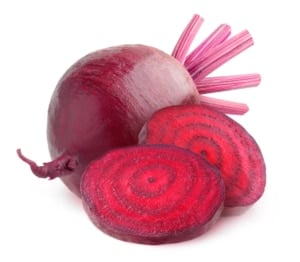
Beetroot is best eaten raw or consumed as juice so your body can best absorb the important nutrients it contains. It goes without saying that it can also be cooked. This reduces the amount of oxalic acid, but also means that some of the other ingredients are lost too.
Uses for beetroot juice
Beetroot juice can be added to various drinks and dishes.
You can find four examples of how to use beetroot juice below.
In a smoothie
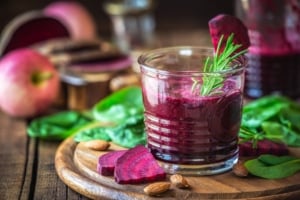
Beetroot smoothie
Beetroot juice mixes well with other healthy ingredients to make a delicious smoothie and you can adjust the taste to your liking.
Just chop the beetroot and mix it with some other fruits or vegetables, such as bananas or blueberries. You could also add some dairy-free milk to make the smoothie creamier.
In spread or hummus
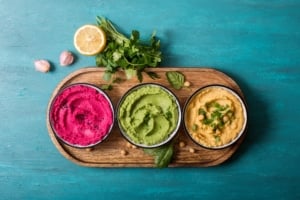
The spread will keep for about a week in the fridge, but can also be kept longer frozen, which is useful if you have made a large quantity, for example.
Pastries and muffins
Beetroot juice is also a great addition to different baking recipes, for making beetroot muffins or cake, for example.
Ravioli with beetroot juice
With 150 milliliters of beetroot juice, you can make a delicious ravioli dish for four people. The juice makes the pasta dough turn bright red, so it really catches the eye. For the filling, you could use some creamy goat’s cheese, for example.
Making beetroot juice at home
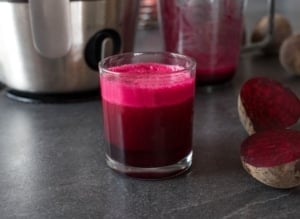
This is a quick and easy way to get your recommended daily intake of vitamins and the like, and if you’re thinking of opting for the juice, it’s worthwhile to make it yourself.
It only takes a few minutes to juice a beetroot yourself and the valuable nutrients and fiber often lost in industrially produced juices are preserved.
What’s more, homemade beetroot juice contains no added sugar or salt, which are common additives if you were to purchase juice from the store.
Using a juicer
You can make beetroot juice with or without a juicer, but it goes without saying that it’s a little less effort if you do have the appliance.
Make sure you buy quality organic ingredients too.
Here’s how to make beetroot juice with a juicer:
- Use a brush to wash the vegetable thoroughly and then remove the ends. Smaller beetroots are sweeter and milder in taste.
- You can either leave the peel on the beetroot, or remove it if it is too hard.
- Cut the beetroot into small pieces and put the pieces into the juicer. You can wear gloves to protect your hands from turning red.
- If you want a thinner juice, filter the mixture through a fine sieve and add water.
And there you have it: beetroot juice. Store it in a cool place and use it within a few days. You could also add a few drops of oil to the juice to help your body better digest the vitamins.
If you don’t like the taste of pure beetroot juice, you can also add other vegetables or fruits. Carrots, apples, ginger or half a lemon, for example, can be used to soften the earthy taste slightly.
Making juice without a juicer
If you don’t have a juicer, you can also use a powerful blender and net to make the juice.
- Follow steps 1 to 3 above, but it’s better to cut the pieces a little smaller when using a blender.
- Put everything into the blender and add some water – this will make it easier for your blender to chop everything up.
- Now turn the blender on and let it run for a few minutes so everything becomes nice and smooth.
- Put the blended mass into a clean net and squeeze it thoroughly over a glass. Your beetroot juice is now ready.
If you like beetroot juice and are thinking about making it more often, you should consider buying a juicer, because continuing to use a blender will consume a lot of energy in the long run.
Here are the nutritional values of 100 grams of beetroot juice.
Nutritional information (per 100 g)
Calories: 43 kcal
Fat: 0.2 g
Carbohydrates 10 g
Protein: 1.4 g
Fiber: 2.8 g
Water: 89.6 g
Sugar: 7 g
Iron: 0.8 mg
Buying beetroot juice

Buying beetroot juice
If you don’t have the time or simply don’t want to make beetroot juice yourself, you can, of course, buy it in the supermarket.
Take note, however, that industrially produced juices often contain additives such as sugar.
If you do decide to buy beetroot juice, make sure it is certified organic.
The juice should not be from concentrate and should only contain a small amount of sugar. Some juices are also made as part of a climate-friendly production process.
One disadvantage of buying juice from a store, however, is that elevated nitrate levels are often found. If you want to be sure that your beetroot juice really benefits your health, it’s better to invest a few minutes of your time and make it yourself.
Other juices which increase hemoglobin
Generally speaking, juices from red vegetables are said to increase your hemoglobin levels. In addition to beetroot juice, you can also drink red grape, strawberry or redcurrant juice.
Even light-colored juices, such as from grapefruit, pear, apple or white grape, can help with the bioavailability of iron. This is because the vitamin C these juices contain helps your body to absorb iron from food.
Therefore, you should always take supplements with a high iron content together with fresh juice so you can help your body absorb the iron.
